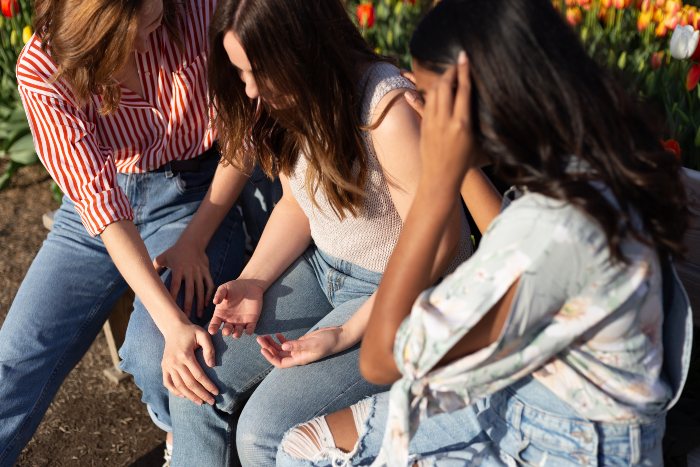Friendship breakups can be just as painful as romantic ones. Losing a friend can leave you feeling lonely, rejected, and questioning what went wrong. The feelings of rejection can be especially difficult when the friend is the one who seems to have ended the friendship by not making time for you. In this article, we will explore the emotions and challenges of dealing with a friendship breakup, and offer tips and strategies for moving on and finding new connections.

Allow yourself to feel your emotions
It’s normal to feel a range of emotions after a friendship ends. Allow yourself to feel sad, angry, or hurt, but try not to dwell on negative feelings for too long. Feeling your emotions is important because it is a natural and healthy way to process and cope with difficult experiences. When we try to suppress or ignore our emotions, they can become bottled up and cause negative effects on our mental and physical well-being.
Expressing and understanding your emotions can help you make sense of what you’re going through and help you to find ways to cope. It can also help you to identify patterns and triggers that contribute to your feelings and can help you to make changes in your life.
Also, feeling your emotions can help you to heal from the experience, grow, eventually find closure and move forward. Also, holding back your emotions can make you feel isolated. At the end of the day, everyone experiences difficult emotions at some point in their life, and it’s not a sign of weakness. It’s a normal part of the human experience.
Reflect on the friendship
Take some time to reflect on the friendship and what it meant to you. Consider what you learned from the experience and how it has helped you grow. Don’t focus only on the negative. It’s an important step in healing and moving on after a friendship breakup. It can help you to:
- Understand the dynamics of the friendship: By thinking about the friendship, you can better understand what may have led to its ending. This can help you to identify patterns and triggers that may have contributed to the breakdown of the friendship.
- Gain closure: You will find closure and make sense of what happened. It can also help you to come to terms with the end of the friendship and move forward.
- Learn from the experience: This way, you could grow as a person. By taking the time to think about the friendship and what you gained from it, you can gain valuable insight that you can apply to future relationships.
- Appreciate the good times: It can help you to remember the good times and the positive aspects of the relationship. TYou will feel more positive and grateful for the time you spent together.
- Move on: Try to find new connections. It allows you to process the loss and gain perspective, to understand what you want in your future relationships and what you don’t.
Reflecting on the friendship takes time, and it’s important to be gentle with yourself during this process. Healing doesn’t happen in one day, too, and it’s okay to grieve the loss of the friendship.
Reach out for support

Talk to a trusted friend or family member about your feelings. They may be able to offer a fresh perspective and support you through the process.
Practice self-care
Self-care helps cope with a friendship breakup and take care of your mental and emotional well-being. Here are some ideas for practicing self-care:
- Engage in physical activities: Exercise can help to reduce stress and improve your mood. Take a walk, go for a run, or try a yoga class.
- Practice mindfulness: Mindfulness exercises, such as meditation and deep breathing, can help you focus on the present moment and reduce anxiety and stress.
- Get enough sleep: Make sure you’re getting enough sleep each night. Lack of sleep can contribute to feelings of sadness and depression.
- Connect with others: Surround yourself with supportive people. Reach out to friends and family for support, or consider joining a support group.
- Do something you enjoy: Engage in activities that make you happy and bring you pleasure. It can be something as simple as reading a book, listening to music, watching a movie, cooking or anything you like.
- Take time for yourself: Give yourself time to relax and unwind. Take a bath, have a glass of wine, or indulge in your favorite hobby.
Self-care is different for everyone. You can find activities that work for you. Remember to be kind to yourself during this process.
Give yourself time

Healing takes time, so be patient with yourself. It’s okay to grieve the loss of the friendship, but eventually, you will be able to move on.
Learn from the experience
Try to learn from the experience so that you can be more mindful and intentional in your future relationships.
Consider seeking professional help
If the friendship breakup is causing severe emotional distress, it’s advisable to seek professional help from a therapist or counselor.
How to know if it’s a breakup or a break?
It can be difficult to determine whether a friendship is ending permanently or if it’s just a temporary break. Here are a few things to consider to help you be sure:
- Communication: If your friend is not communicating with you or is avoiding contact, it may indicate that the friendship is over. On the other hand, if you both have agreed to take a break and touch base later, it may be a temporary break.
- Reasons for the change: If your friend has cited specific reasons for wanting to end the friendship, it’s more likely to be a permanent breakup. If the reasons are more general, such as needing space or being busy, it may be a temporary break.
- Time frame: If your friend has given you a specific date or time when they will be in touch or when they want to reconnect, it may be a break.
- Future plans: If your friend has openly said they don’t see a future for the friendship, it’s likely to be a permanent breakup. If they have said they want to reconnect in the future, it may be a break.
Ultimately, it’s important to have an honest and direct conversation with your friend to understand their perspective and what they see as the future of the friendship. It’s ok for people’s priorities and circumstances to change, and if the friendship is meant to be, it will likely come back.
How to talk to a friend about the state of our friendship?

It’s understandable that you may not want to come across as needy or pushy when talking to a friend about the state of your friendship. Here are a few ways you can approach the conversation:
- Be honest with yourself: Before you have the conversation, take some time to reflect on the friendship and be honest with yourself about what you want and what you’re willing to accept.
- Be respectful of their perspective: Your friend may have different priorities or circumstances that are affecting the friendship. Be respectful of their perspective and try to understand where they’re coming from.
- Use “I” statements: When having the conversation, try to use “I” statements rather than “you” statements. This can help avoid placing blame and make the conversation more open and non-confrontational.
- Communicate your feelings: Share your feelings and concerns about the friendship. Let them know how the changes in the friendship are affecting you.
- Listen actively: Listen actively to your friend’s perspective.
- Be open to compromise: Be open to compromise and explore ways to maintain the friendship despite the changes.
- Be prepared for any outcome: The conversation’s outcome may not be what you want. Try to be prepared for that.
A friendship ending is not a reflection of your worth as a person. It’s just another stage of your life and a completely natural experience. People come and go. At the end of the day, you will find new friends and connections.











